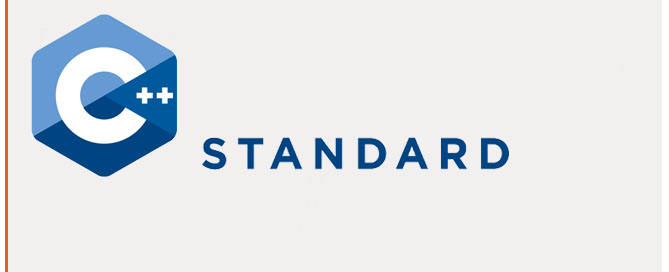C++ Pointers
For a C++ program, the memory of a computer is like a succession of memory cells, each one byte in size, and each with a unique address. These single-byte memory cells are ordered in a way that allows data representations larger than one byte to occupy memory cells that have consecutive addresses.
When a variable is declared, its value is assigned to a specific location in memory (its memory address)
With pointers you can use dynamic memory (heap) instead of static memory (stack) only. Using pointers the visibility of a variable will be position indipendent.
(&) address of… – (*) dereference operator
...
myvar = 25; // the value of this var is 25
foo = &myvar;// example: the address of myvar is memory address 1776
bar = myvar; // bar is 25
baz = *foo; // baz equal to value pointed to by foo (25)
...
Workink example:
// my first pointer
#include <iostream>
using namespace std;
int main ()
{
int firstvalue, secondvalue; // declaring variables
int * mypointer; // declaring pointer wuth asterisk
mypointer = &firstvalue;
*mypointer = 10;
mypointer = &secondvalue;
*mypointer = 20;
cout << "firstvalue is " << firstvalue << '\n';
cout << "secondvalue is " << secondvalue << '\n';
return 0;
}
Ther result is:
10
20
For italian people: come funziona?
1. dichiaro le variabili firstvalue, secondvalue; -> il sistema operativo assegna loro un indirizzo di memoria
2. dichiaro il puntatore usando *mypointer
3. il puntatore ‘punta’ all’indirizzo di firstvalue e gli assegna un valore di 10
4. LO STESSO PUNTATORE ‘punta’ all’indirizzo di secondvalue e gli assegna un valore di 20
5. Ora firstvalue=10 e secondvalue=20
Example:
// more pointers
#include <iostream>
using namespace std;
int main ()
{
int firstvalue = 5, secondvalue = 15;
int * p1, * p2;
p1 = &firstvalue; // p1 = address of firstvalue
p2 = &secondvalue; // p2 = address of secondvalue
*p1 = 10; // value pointed to by p1 = 10
*p2 = *p1; // value pointed to by p2 = value pointed by p1
p1 = p2; // p1 = p2 (value of pointer is copied)
*p1 = 20; // value pointed by p1 = 20
cout << "firstvalue is " << firstvalue << '\n';
cout << "secondvalue is " << secondvalue << '\n';
return 0;
}
The result is:
firstvalue is 10
secondvalue is 20
Arrays and Pointers
Example with an array:
// more pointers
#include <iostream>
using namespace std;
int main ()
{
int numbers[5];
int * p;
p = numbers; *p = 10;
p++; *p = 20;
p = &numbers[2]; *p = 30;
p = numbers + 3; *p = 40;
p = numbers; *(p+4) = 50;
for (int n=0; n<5; n++)
cout << numbers[n] << ", ";
return 0;
}
The result is:
10, 20, 30, 40, 50,
Const
Keyword ‘const’ declares pointers that can access the pointed value to read it, but not to modify it.
...
int x;
int y = 10;
const int * p = &y;
x = *p; // ok: reading p
*p = x; // error: modifying p, which is const-qualified
...
Working example:
// pointers as arguments:
#include <iostream>
using namespace std;
void increment_all (int* start, int* stop)
{
int * current = start;
while (current != stop) {
++(*current); // increment value pointed
++current; // increment pointer
}
}
void print_all (const int* start, const int* stop)
{
const int * current = start;
while (current != stop) {
cout << *current << '\n';
++current; // increment pointer
}
}
int main ()
{
int numbers[] = {10,20,30};
increment_all (numbers,numbers+3);
print_all (numbers,numbers+3);
return 0;
}
The result is:
11
21
31
Pointers can also be themselves const:
...
int x;
int * p1 = &x; // non-const pointer to non-const int
const int * p2 = &x; // non-const pointer to const int
int * const p3 = &x; // const pointer to non-const int
const int * const p4 = &x; // const pointer to const int
...
const int * p2a = &x; // non-const pointer to const int
int const * p2b = &x; // also non-const pointer to const int
...
Pointers and string literals
const char * foo = "hello";
Address Value
1702 h
1703 e
1704 l
1705 l
1706 o
1707 \0
Pointers to Pointers
C++ allows the use of pointers that point to pointers, the syntax simply requires an asterisk (*) for each level of indirection in the declaration of the pointer:
char a;
char * b; // pointer to variable, one asterisk
char ** c; // pointer to pointer , two asterisk
a = 'z';
b = &a;
c = &b;
Void (privo) Pointers
Void pointers are pointers that point to a value that has no type.
// increaser
#include <iostream>
using namespace std;
void increase (void* data, int psize)
{
if ( psize == sizeof(char) )
{ char* pchar; pchar=(char*)data; ++(*pchar); }
else if (psize == sizeof(int) )
{ int* pint; pint=(int*)data; ++(*pint); }
}
int main ()
{
char a = 'x';
int b = 1602;
increase (&a,sizeof(a)); // sizeof: the number of bytes required to represent the type.
increase (&b,sizeof(b));
cout << a << ", " << b << '\n';
return 0;
}
The result is:
y, 1603
Null Pointers
Sometimes, a pointer really needs to explicitly point to nowhere, and not just an invalid address.
// null pointers
int * p = 0;
int * q = nullptr;
Pointers to Functions
The typical use of this is for passing a function as an argument to another function.
The name of the function is enclosed between parentheses () and an asterisk (*) is inserted before the name.
// pointer to functions
#include <iostream>
using namespace std;
int addition (int a, int b)
{ return (a+b); }
int subtraction (int a, int b)
{ return (a-b); }
int operation (int x, int y, int (*functocall)(int,int))
{
int g;
g = (*functocall)(x,y);
return (g);
}
int main ()
{
int m,n;
// passing a function as an argument to another function
int (*minus)(int,int) = subtraction;
m = operation (7, 5, addition);
n = operation (20, m, minus);
cout <<n;
return 0;
}
The result is: 8
For italian peolple: come funziona?
1. m = operation (7, 5, addition); -> int operation (int x, int y, int (*functocall)(int,int))
passiamo i valori 7, 5 e la funzione da richiamare
2. g = (*functocall)(x,y);
richiama la funzione addition inviando i valori 7 e 5 -> il valore sarà m= 12
3. n = operation (20, m, minus); dove -> int (*minus)(int,int) = subtraction;
passiamo i valori 20, 12 e la funzione substraction -> il valore sarà 20-8= 12
My website: http://www.lucedigitale.com
Reference: http://en.wikipedia.org/wiki/Sizeof
Reference: http://www.cplusplus.com/doc/tutorial/pointers/



